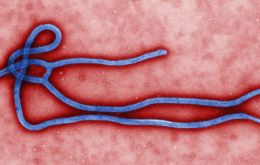MercoPress. South Atlantic News Agency
Tag: World Health Organization (WHO)
-
Monday, September 22nd 2014 - 05:12 UTC
Experts fear the Ebola virus could mutate to become an airborne disease

As the Ebola outbreak continues to spiral out of control, with the number of cases rising faster than the ability to contain them, some scientists are concerned that the virus could mutate to become an airborne disease, greatly increasing its potential for contagion.
-
Tuesday, September 2nd 2014 - 22:49 UTC
Ebola outbreak in Congo is the indigenous 'Zaire strain' and not connected to West Africa

Results from virus sequencing of samples from the Ebola outbreak in the Democratic Republic of Congo (DRC) have been analyzed and they belong to the so called Zaire strain, in a lineage most closely related to a virus from the 1995 Ebola outbreak in Kikwit, DRC.
-
Wednesday, August 13th 2014 - 06:29 UTC
First European Ebola infected dies; WHO approves unproven drugs for people at risk

Spanish priest Miguel Pajares, 75, the first European infected by a strain of Ebola that has killed more than 1,000 people in West Africa, has died in hospital in Madrid, a spokeswoman for the city's health authorities said.
-
Saturday, August 9th 2014 - 06:38 UTC
Ebola outbreak becomes a “public health emergency of international concern”

World Health Organization declared on Friday that the Ebola outbreak spreading across West Africa has become a “public health emergency of international concern”. WHO also revealed that Ebola took an additional 29 lives between Tuesday and Wednesday alone.
-
Tuesday, August 5th 2014 - 06:58 UTC
World Bank pledges 200 million dollars to combat the West Africa Ebola epidemic

With the latest death toll from the West Africa Ebola epidemic now at 887, the World Bank Group pledged on Monday as much as 200 million dollars in emergency funding to help Guinea, Liberia, and Sierra Leone contain the spread of Ebola infections, help their communities cope with the economic impact of the crisis, and improve public health systems throughout West Africa.
-
Saturday, July 12th 2014 - 10:40 UTC
UN members pledge to combat avoidable non-communicable diseases and preventable deaths

UN Member States have reaffirmed their commitment to take bold measures to reduce the avoidable burden of non-communicable diseases. These ailments, including heart disease and stroke, cancer, diabetes and lung disease kill 38 million people every year, many of them before they reach the age of 70.
-
Monday, July 7th 2014 - 22:49 UTC
FAO/WHO elaborating new guidelines for identifying food-borne parasites

A “Top Ten” list identifying the food-borne parasites of greatest global concern has been released by FAO, and new guidelines are being developed to control them. The parasites affect the health of millions of people every year, infecting muscle tissues and organs, causing epilepsy, anaphylactic shock, amoebic dysentery and other problems. Some can live on in our bodies for decades.
-
Friday, June 20th 2014 - 06:29 UTC
Antibiotic-resistant “superbug” detected South Korea raw squid

A dangerous antibiotic-resistant “superbug” has been found in the North American food supply for the first time, according to researchers from the University of Saskatchewan.
-
Thursday, May 29th 2014 - 02:45 UTC
WHO calls on countries to raise taxes on tobacco to prevent addiction

On World No Tobacco Day (31 May), WHO calls on countries to raise taxes on tobacco to encourage users to stop and prevent other people from becoming addicted to tobacco. Based on 2012 data, WHO estimates that increasing tobacco taxes by 50%, all countries would reduce the number of smokers by 49 million within the next three years and ultimately save 11 million lives.
-
Monday, May 19th 2014 - 21:00 UTC
WHO's Dr. Chan targets childhood obesity: “our children are getting fatter”

World Health Organization Director-General Dr. Margaret Chan voiced deep concern about the increase worldwide of childhood obesity, with numbers climbing fastest in developing countries. “As the 2014 World Health Statistics report bluntly states, ‘Our children are getting fatter,’” she said during her opening speech to the Health Assembly on Monday in Geneva.
